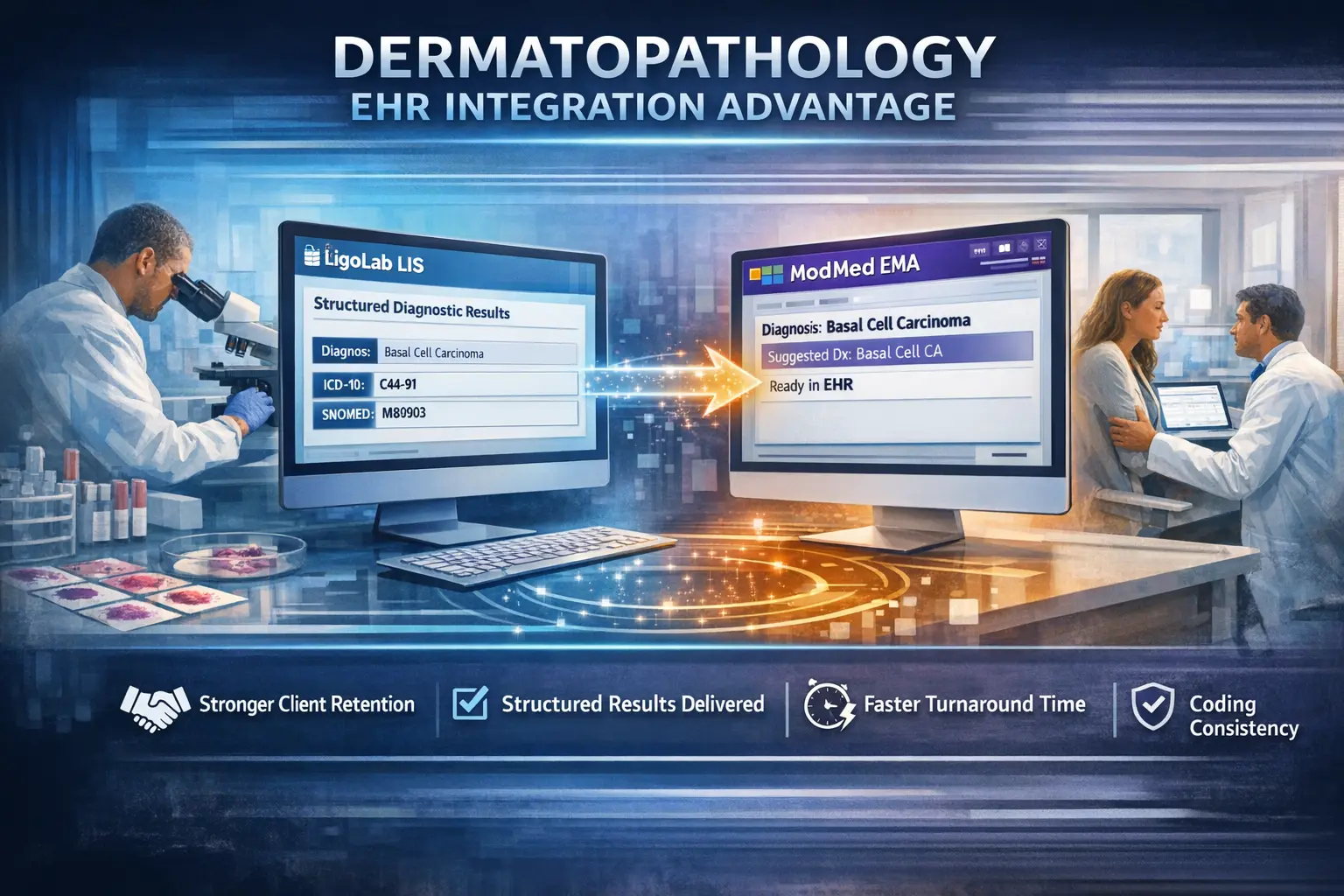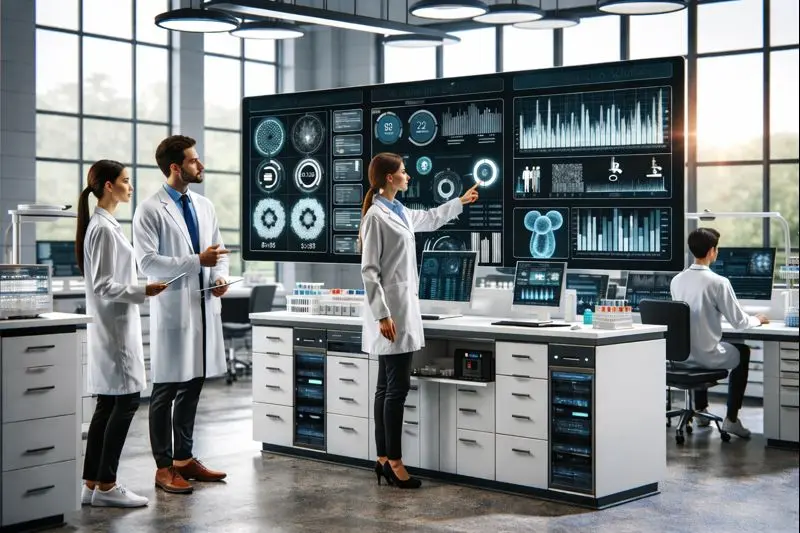Blog
LigoLab’s Essential Tier: LIS Software Designed to Meet the Needs of Small Clinical Labs and Pathology Groups
September 3, 2025
In today’s rapidly evolving healthcare environment, small clinical labs and pathology groups face unique challenges. They must maintain high standards of accuracy and compliance while operating within tight budgets and resource constraints. For many of these labs, finding a medical laboratory information system (LIS software) that aligns with their operational scale and growth potential is a major obstacle. Too often, the industry promotes rigid, one-size-fits-all LIS systems that fail to adapt as labs evolve. That’s where LigoLab’s Essential Tier stands apart.
Discover More: The Essential Tier - Your Foundation for Laboratory Efficiency & Growth
A Scalable Pathology Lab Software Solution Built for Today’s Realities
LigoLab, a leader in medical LIS and lab revenue cycle management (lab RCM) software, has developed a tiered pricing platform designed to support labs at every stage of growth. The Essential Tier provides small and mid-sized labs with a comprehensive set of laboratory information system functions and lab revenue cycle management tools to streamline operations, ensure quality control, and deliver accurate results—all without the cost or complexity of enterprise-level diagnostic lab software systems.
What makes the Essential Tier unique is its scalability. Labs can begin with foundational features such as order entry, result entry, basic reporting, and workflow management, and later expand their lab information system capabilities as their volume grows or their services diversify. Upgrading to higher tiers requires no LIS lab overhaul, avoiding the disruption of switching LIS software vendors or reimplementing laboratory software systems.
Case Study: OnePath - Transforming Pathology Lab Management Through Digital Innovation

Core Modules That Power the Essential Tier
Order Entry: This module is the starting point of every lab workflow, capturing essential patient and order information. It enables seamless entry of patient demographics, test selection, and lab billing details. It also supports ask-at-order-entry (AOE) questions and integrates with electronic health record (EHR) systems for automated data transfer. By reducing manual data entry and minimizing errors, it speeds up processing and improves accuracy from the start.
Label Generation: As soon as an order is entered, the LIS system generates unique identifiers for each specimen. These are printed as barcode labels, and when using native ZPL integration with Zebra printers, the need for additional drivers is eliminated. Administrators can customize label templates to meet the lab's specific formatting needs and ensure accurate sample tracking throughout every stage of the LIS pathology workflow.
Grossing: Designed for anatomic pathology LIS lab solutions, the Grossing module provides a streamlined interface for technologists to enter detailed specimen data. Users can document specimen characteristics (size, color, weight, abnormalities), designate tissue sections for examination, and print barcoded labels on the spot. This structured and barcode-driven lab workflow supports precise sample tracking and clear downstream communication.
Histology: The Histology module manages the end-to-end workflow from block processing to case sign-out. It provides tools to monitor and record each stage: embedding, microtomy, slide generation, staining, and final review. Integrated barcode scanning ensures traceability, while double checks (such as fragment counts during embedding) enhance quality control. The module supports integration with automated stainers and etching systems, further reducing errors and increasing efficiency.
Cytology: Tailored to both GYN and non-GYN workflows, this module supports everything from Pap smear processing to fine-needle aspiration analysis. For GYN, it includes built-in support for the Bethesda reporting system, ensuring adherence to cytotechnologist screening and QC procedures. For non-GYN, it allows customized workflows based on specimen types and supports image capture and annotation for complex cases.
Molecular: The Molecular module is optimized for complex workflows involving DNA, RNA extraction, PCR, sequencing, and data analysis. It supports batch processing, worklists, and automated report generation. Preliminary results can be released before full testing is complete, giving providers faster access to actionable data. The module is highly configurable and compliant with molecular LIS testing standards and regulatory guidelines.
Microbiology: This module automates data capture from instruments used in culture and sensitivity testing. It supports workflows for organism identification, susceptibility testing, and real-time quality control. By reducing manual input and streamlining report generation, the module enhances lab efficiency and ensures the timely delivery of critical results.
Clinical: Designed to handle a wide range of routine and advanced clinical tests, this module streamlines test ordering, processing, and reporting. It integrates with a variety of lab instruments and supports batch orders, standing orders, and reflex testing. The built-in rules engine automates decision-making based on result values, reducing manual review time. Final reports can consolidate results across departments and be delivered electronically.
Result Entry: This module offers versatile options for entering and reviewing test results, including structured data fields, voice-to-text functionality, and customizable macros. It also supports automated imports from lab instruments and calculated result fields. Results flow seamlessly into the reporting system, with every change tracked for audit and compliance. This minimizes manual entry, increases productivity, and improves accuracy.
Audit Trail: Full audit trail functionality is embedded across the LigoLab platform. Every change—including user, timestamp, and value—is logged, allowing for complete traceability. This supports CAP, CLIA, and HIPAA compliance while providing lab administrators with a reliable tool for investigating discrepancies and maintaining data integrity.
Reporting: The Reporting module synthesizes clinical, molecular, and anatomic testing data into a single, comprehensive report. It supports cumulative reports, automatic appending of addenda, and delivery through multiple channels (email, fax, portal, or print). Templates can be customized with lab branding, and the module enhances communication with providers by presenting results in a clear, professional format.
Support: LigoLab delivers reliable support during regular business hours for non-urgent issues, and 24/7 support for critical situations. A dedicated portal allows users to submit, track, and manage tickets efficiently. Typical response times are under 24 hours, ensuring labs receive timely assistance when needed.
Discover More: See How LigoLab Bolsters Its Future-Ready Medical LIS & Lab RCM Informatics Platform With Unlimited and Unmatched Customer Service

Designed by Lab Experts, for Lab Professionals
What truly sets LigoLab apart is its deep industry experience. Many team members have backgrounds in laboratory operations, enabling them to build advanced pathology lab software that reflects real-world challenges. This results in faster implementation, intuitive design, and expert support.
The Essential Tier goes beyond covering the basics—it lays the foundation for long-term success for small labs with big ambitions. With flexible pricing, unlimited user access, and hassle-free upgrades that keep labs on the cutting edge, LigoLab enables teams to concentrate on what matters most: delivering precise diagnostics and exceptional patient care.
Discover More: Navigating the Future of Pathology: The LigoLab Advantage
Start Strong, Scale with Confidence
The search for an LIS healthcare platform that balances functionality, affordability, and future readiness can be daunting for small clinical labs and pathology groups. LigoLab’s Essential Tier answers this need with a solution that delivers immediate value and ongoing scalability.
If your lab is ready to modernize its operations without overextending its resources, the Essential Tier is a great fit.







